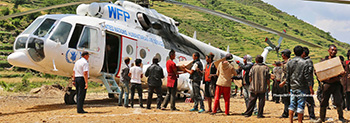 Two weeks after a devastating earthquake hit Nepal¸ the United Nations World Food Programme (WFP) has warned that “severe logistical challenges” are getting in the way of aid reaching hundreds of thousands of survivors in some of the country’s hardest-hit areas.
Two weeks after a devastating earthquake hit Nepal¸ the United Nations World Food Programme (WFP) has warned that “severe logistical challenges” are getting in the way of aid reaching hundreds of thousands of survivors in some of the country’s hardest-hit areas.
“We in no way want a lack of resources to force us to limit the assistance we’re providing,” Richard Ragan, who is coordinating WFP’s relief operation, said from Kathmandu.
“The people of Nepal are resilient, but we can’t expect families to be living in the rubble of their homes, with little food, no roof over their head and the monsoons coming,” he said.
After the initial focus in the relief effort on search and rescue, food has become an increasingly urgent need, WFP said. Thus far, the Programme has distributed food for 300,000 people and is bringing in more helicopters and engaging multiple fleets of small trucks to get supplies to hard-hit rural areas. It is also opening a land route from India to take pressure off Kathmandu airport.
But WFP’s emergency operations are only four per cent funded, with much of the food distributions and common services provided to date enabled by internal resources which are reaching their limit.
Funded entirely by voluntary contributions from governments, companies and private individuals, WFP has appealed for $116.5 million to provide food for 1.4 million people over the next three months.
Many of those affected in the most remote rural areas are subsistence farmers who lost the crops that were harvested just before the quake hit, WFP said. Families urgently need food to carry them over until the next harvest while they rebuild their lost livelihoods. It is vital that the response from the international community matches the immense needs of the people of Nepal.
On 25 April, a 7.8 magnitude earthquake shook Nepal, killing thousands while limiting access to food and leaving some 3.5 million in need of food assistance. An estimated 8 million people across the country’s Western and Central Regions are affected by the disaster, including its largest cities, Kathmandu and Pokhara.

